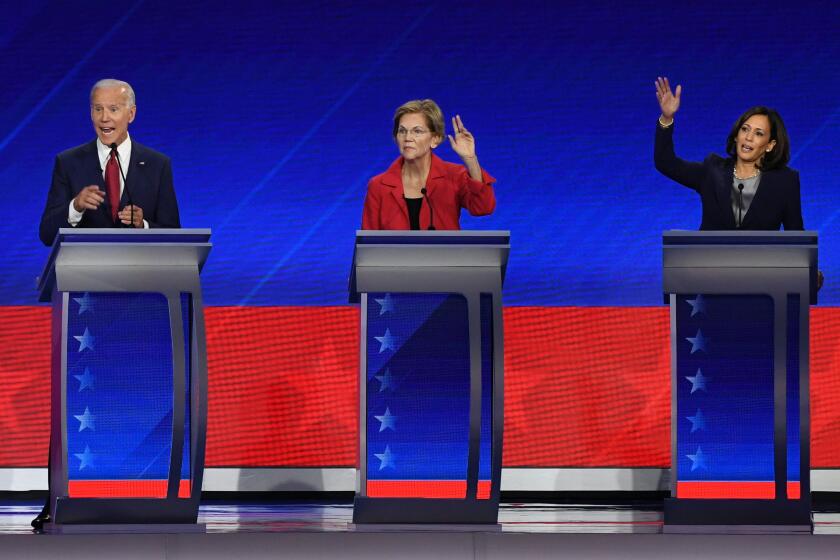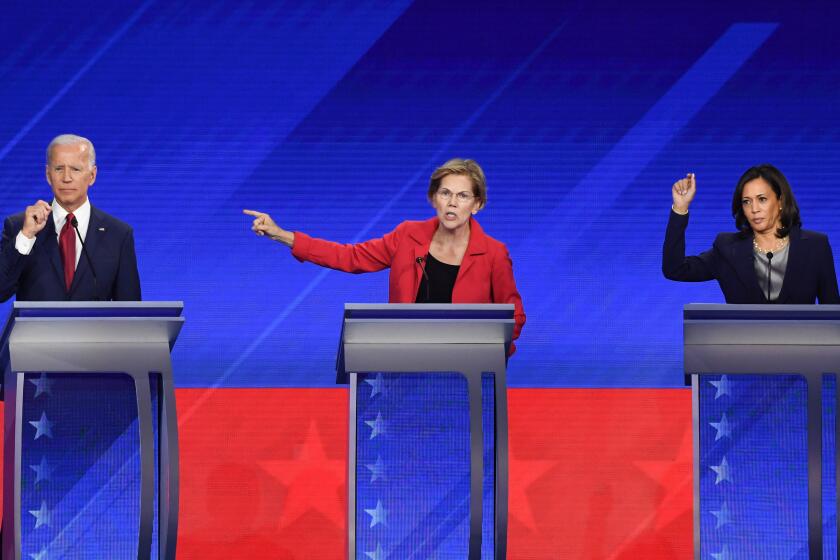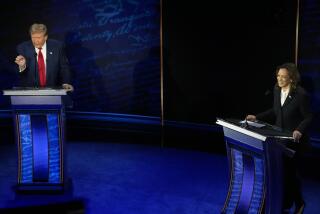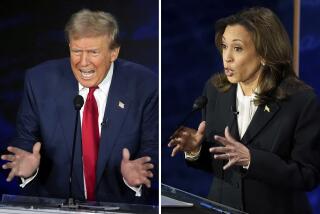News Analysis: Democrats head toward a three-person race while the second tier scrambles
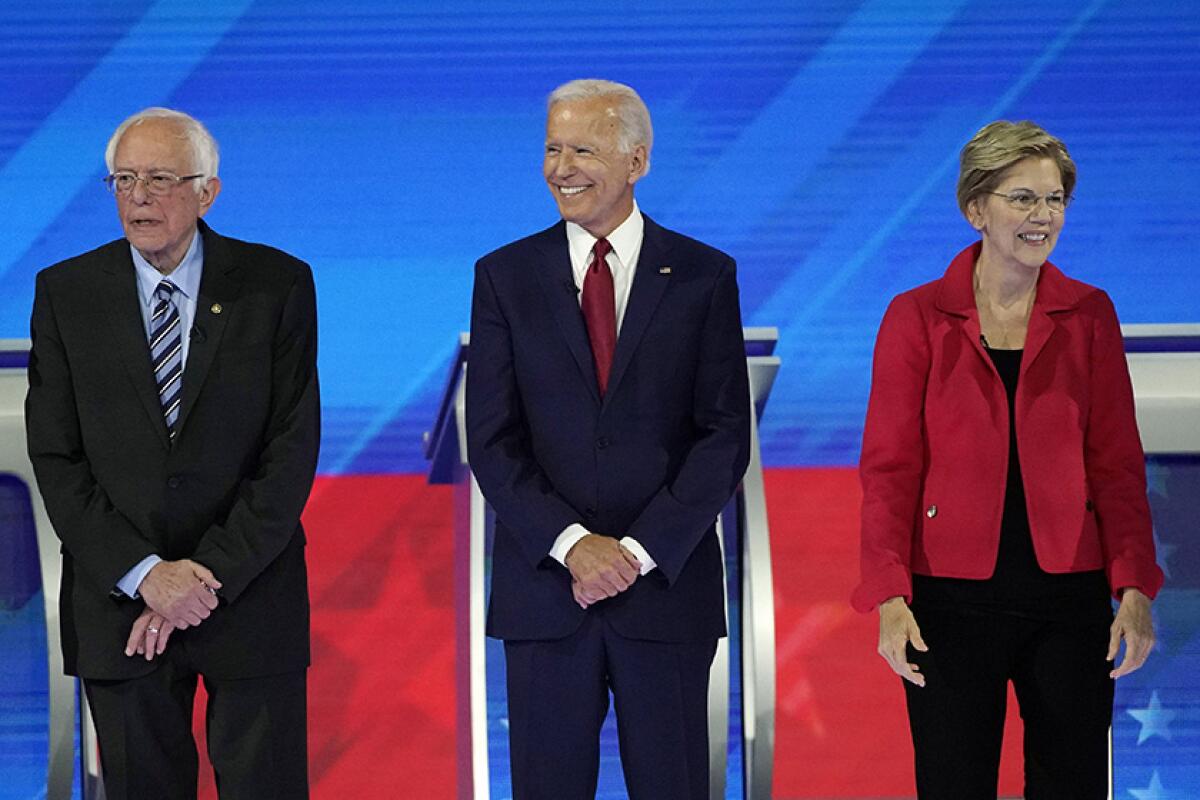
- Share via
WASHINGTON — The sprawling Democratic primary field has been headed toward a three-person race, and despite strenuous efforts by the trailing candidates, Thursday’s debate seems unlikely to have significantly changed that.
Former Vice President Joe Biden, Sen. Bernie Sanders of Vermont and Sen. Elizabeth Warren of Massachusetts have pulled away from the pack in most national and early-state polls over the last month.
It should not be surprising that those three candidates have risen to the top of the field of more than 20: Biden, Sanders and Warren are the three contenders who came to the race with a national political brand, and they have used their campaigns to hone their messages with a clarity that none of their competitors have.
More surprising is the fact that, in a campaign that started with paeans to the party’s need for youth and diversity, none of the many other candidates has elbowed into a place among the three white septuagenarians.
The problem: While some of the second-tier candidates have had solid attention-grabbing campaign moments, none has been able to translate them into durable political gains.
Thursday’s debate in Houston presented those candidates with one of a dwindling number of opportunities they will get to keep a broader choice before primary voters.
It won’t be clear for a week or more whether any of them had true breakout moments. But the seven rivals on the stage tried just about every tactic in the book.
Sen. Amy Klobuchar of Minnesota sought to offer moderate alternatives to the health, gun control and tax policies advanced by Sanders and Warren. Early on, she flatly declared Sanders’ “Medicare for all” plan a “bad” idea.
Former Obama Cabinet official Julián Castro repeatedly challenged Biden, including a blunt suggestion that he was losing his memory — a personal attack that seemed to backfire, both on style and on substance.
Sen. Kamala Harris of California tried to focus on attacking President Trump, not her Democratic rivals — a somewhat surprising stance for a candidate who memorably attacked Biden in their first debate in June and enjoyed a noticeable, if temporary, boost afterward.
The 10 candidates who qualified for tonight’s debate are Joe Biden, Cory Booker, Pete Buttigieg, Julián Castro, Kamala Harris, Amy Klobuchar, Beto O’Rourke, Bernie Sanders, Elizabeth Warren and Andrew Yang.
Sen. Cory Booker of New Jersey preached for “common cause and common purpose” rather than Democrats trying to “demonize and degrade each other.” He also landed one of the night’s toughest critiques of Biden, though he did it in a CNN interview after the debate rather than onstage:
“There’s a lot of people concerned about Joe Biden’s ability to carry the ball all the way across the end line without fumbling,” he said. “I know that Castro had some really legitimate concerns.”
While the candidates all labored to draw distinctions among themselves, they also leavened the debate with more kind words for one another than in the previous confrontations, sensitive to the risk of alienating voters who want the party to come together.
The result was lavish praise on Sanders for having pioneered Medicare for all; on former Rep. Beto O’Rourke for his handling of the aftermath of a mass shooting in his hometown of El Paso; and especially on former President Obama, a shift in tone from the July debate, when some candidates criticized his policies and took heat from Obama loyalists for doing so.
Warren and Harris both took time early on to praise Obama’s handling of healthcare, even as they touted plans that would go significantly beyond Obama’s signature Affordable Care Act. Both candidates have been seeking to expand their support among African American voters, a group that gives the edge to Biden and among whom Obama remains especially popular.
Still, the spotlight shone most brightly on the top three candidates: They were the target of barbs. Biden and Warren got the most speaking time. And they demonstrated a great deal of how they hope to play their hands and compete with one another in the next, more intense chapter of the primary campaign.
Warren, for the most part, aimed her criticism at corruption and the political system, not her rivals. Political analysts have been predicting that at some point Warren and Sanders, ideological soulmates, will have to begin drawing distinctions between each other. That time did not come Thursday.
Though she has yet to put out her own detailed plan for healthcare, Warren doubled down on her commitment to Sanders’ signature healthcare proposal, Medicare for all.
Sanders focused more on drawing distinctions with Biden — saying they were on the opposite side of Obama-era policies on trade and the Iraq war.
Biden took a swipe at Warren for dodging a question about whether middle-class families would see their taxes go up under Medicare for all. Though he may never escape his habit of verbal wandering, he has grown more comfortable than he was earlier in his criticisms of his two liberal rivals for going too far and wanting to spend too much.
Thursday was the first time Biden appeared on the same debate stage as Warren, at a time when his advisors indicate that they see her as a bigger threat than Sanders. Even though she still ranks closely with Sanders in most polls, trading second and third places in different surveys, Warren’s campaign has shown unique strength: She is the only candidate who has shown steady growth in polling over the last several months, while Biden and Sanders have mostly plateaued.
The other candidates on the stage have not yet managed even a plateau.
Mayor Pete Buttigieg of South Bend, Ind., made a big early splash as a preternaturally articulate 37-year-old who raised a ton of money. In Thursday’s debate, he landed one of the stronger critiques of Medicare for all, for denying people the ability to choose private health insurance: “I trust the American people to make the right choice for them,” he said. “Why don’t you?” Overall, however, he ended up as a marginal voice in the debate.
Harris’ focus on Trump seemed a response to the political lessons of her first two debates: She had a breakout moment in the first debate attacking Biden, but the polling and fundraising bump proved short-lived. She faltered in the second debate when she tangled with Biden again and was thrown on the defensive.
O’Rourke is still struggling to light the kinds of sparks that drew him acclaim in his 2018 Senate race against Republican Sen. Ted Cruz.
None of the 10 candidates on the stage Thursday is likely to drop out any time soon: They all have qualified for the October debate.
But most of them continue to give the sense that they’re waiting for one of the top three to falter.
That could well happen in the coming weeks and months. Many Democrats have been predicting a Biden collapse around every corner, due to his age (76), propensity to gaffes and a decades-long voting record that includes some positions on crime, abortion and other issues at odds with today’s liberal consensus.
His performance Thursday included no major missteps but was uneven, sometimes meandering, and included an anachronistic reference to record players that reminded viewers of his roots in another era.
But in the five months since Biden announced his candidacy, he has maintained his polling position as front-runner despite all that. He has shown a lot of the quality that was the subject of the last question posed by Thursday’s debate moderators: resilience.
More to Read
Get the L.A. Times Politics newsletter
Deeply reported insights into legislation, politics and policy from Sacramento, Washington and beyond. In your inbox three times per week.
You may occasionally receive promotional content from the Los Angeles Times.
